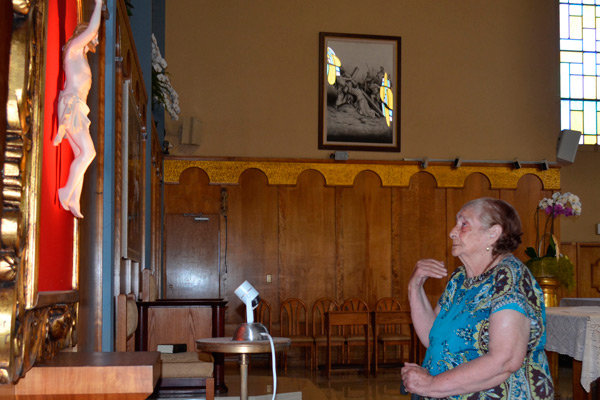
LOS ANGELES — As she shut off the garden hose and set it next to her recently planted flowers, Maria Meza greeted a visitor.
“Yes, come in, everything’s all wet, clean,” she said with a smile.
The 92-year-old said she likes to exchange good-natured banter, but all smiles vanish when Meza begins narrating her family’s ordeal back when she was 7 years old and living in her native Michoacan, Mexico.
“Las balas tronaban (The bullets whistled),” said the survivor of the Cristero War of the 1920s, in which Catholics took up arms to contest the Mexican government’s systematic repression of religion. It is depicted in the movie “For Greater Glory,” opening in U.S. theaters June 1.
In an interview with The Tidings, newspaper of the Los Angeles Archdiocese, Meza said welcomes the idea about the movie and would like to see it if it was shown in Spanish. She taught herself to read and write but found it very difficult to learn English, although she attended several classes after arriving in the U.S. in the 1970s with her husband and 10 children.
Her father, Jose Meza Galvez, was a strong Cristero who hid many priests in his house to help them avoid getting killed by the government that persecuted all Catholics during the three-year civil war. More than 90,000 people died, mostly men and numerous priests, including her uncle, St. Rafael Guizar Valencia. A bishop, he was beatified by Pope John Paul II in 1995 and canonized by Pope Benedict XVI in 2006.
For three days, Maria Meza, her four sisters and their mother, Maria Ayala, hid in a cave while all the men in town fought against the government’s army.
With sadness, she recalled when the war ended. A few days after the war was over a group of military burst into her home and killed her father.
“One shot was enough,” she said. He was about 40 years old.
The rest of the family survived because the army went after the men, Meza said.
“But he died bravely, shouting, ‘Viva Cristo Rey!’ ‘Vivan los Cristeros!'” she said proudly.
After that sad day, her mother made sure that the family’s Catholic heritage stayed alive among her children. Two of the girls entered the religious community Sagrada Familia (Sacred Family); the other three married and passed their strong faith on to their children, along with the Cristero War story.
“I’ve heard this story many times in my life since I was a small boy,” said her son Manuel, 62, the fourth of her 14 children. Four died at a young age.
Although the story has been passed through generations of survivors, it did not make it in the annals of Mexican history. Many analysts presume it is because the Mexican president at that time, Plutarco Elias Calles, who led the war, was one of the founders of the Institutional Revolutionary Party, which ruled the country for the next seven decades.
Even for Manuel, it is hard to believe that the dead were hanged from poles on the roads under the fearful watch of survivors. Others were buried in mass graves.
“Thank God that war finally ended,” Meza said. “They were three long years. They (the soldiers) put houses on fire, raped many women and tried to destroy all religious images.”
That is why she tries to preserve her Catholic beliefs, she confides.
“I don’t want my family to change to another religion,” Meza said. “I respect other people’s beliefs, but we went through so much and I think it was worth it.”
Purposefully, 12 years ago she and her husband bought a house across the street from Resurrection Church in East Los Angeles.
Unless she is sick, which rarely happens, she gets up at 5 o’clock every morning and by 6:45 she is sitting at one of the pews.
“Every single day,” Meza said, except on Sundays, when she attends the 10:30 a.m. Mass together with other family members. She has 60 grandchildren and 40 great-grandchildren.
“I am preparing myself to receive my glory,” she said. She receives Communion every day and prays the rosary every night before going to bed at 9 p.m. sharp.
“When I stand in front of the Judge, I think I will be prepared,” she said proudly. “I think I have a solid faith. Although I don’t know him, I do believe in him. And I don’t lack anything; even in hard times he has provided.
“That shot to my father’s head was not in vain. The seed that my parents planted in me doesn’t wither that easily.”
— By Doris Benavides, Catholic News Service






